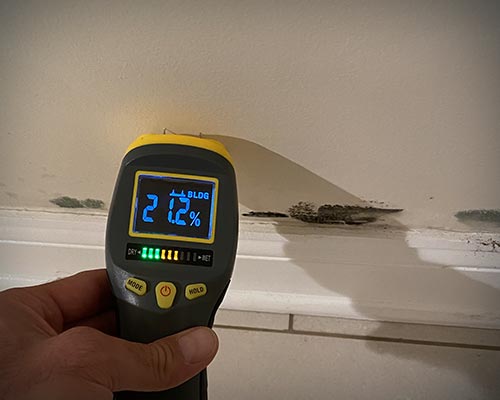Four clues you have mold in the house
SUNDAY, MARCH 20, 2016
When was the last time you thought about mold? Weird thought, isn't it. Most people don't spend too much time thinking about mold. They mostly just try to get rid of it - throw away moldy leftovers, bleach or wipe mold off the bathroom walls, paint over a moldy wall corner.
Unfortunately, mold isn't so friendly, and you don't get rid of it that easily. Mold can grow in your home, and not always in places you'd expect. Moreover, it has effects which you definitely don't expect. So whether you like it or not, you need to think about mold.
Not sure if you have mold? There are some clues.
Clue #1: You can see mold
If you see blackish-greenish splotches or spots on walls or other surfaces, especially in places that have been wet or damp recently, it might be mold. Even experts can't always tell for sure just by looking at it. They can, however, take samples for testing. Sampling can let you know if there is mold, and what type it is. No matter what type of mold, mold can be dangerous. It's a good idea to get it taken care of immediately.
Of course, mold doesn't always grow where you can see it. In fact, it grows mainly where you don't see it. There are thousands of types of mold, in all different colors. There's a chance mold can blend into the place where it's growing, depending on the color. You don't have to see mold to have a mold problem.
Clue #2: There's been water damage
Anytime there's been water damage in your home, it's reasonable to assume mold growth will be following. The water is absorbed in everything, leaving it wet or damp, and creating optimal conditions for mold growth.
Think about areas in your home that could be damp, wet, or humid: the attic, the basement, and anywhere there's pipes or other sources of water. Sometimes there are signs in areas that aren't supposed to be wet at all, like:
- Yellow-brown water stains
- Dimples or bubbles in the ceiling
- Peeling paint
- Spongy, soggy walls
- Damage to wooden window frames, baseboards, and ceiling moldings
When water damage is fresh, mold can be prevented easily if water damage restoration begins promptly. If you discover the damage sometime after it happened, there's a good chance that mold is already a part of the damage you will need to restore.
Another important thing to keep an eye out for, especially in the winter, is condensation on the insides of the windows. If you have condensation, then your relative humidity is probably a bit too high. That can indicate a moisture problem in the home, so it needs to be addressed.
Clue #3: You can smell mold
Even if you have never smelled mold, once it hits your nose you can't be mistaken. That musty and overpowering odor is one of a kind, especially in closed rooms or areas. Mold can be completely hidden behind the wall, behind the wallpaper, even in the air vents, and the only hint might be the odor.
If you smell something not right, pay attention. Even if you only notice it in one small area of your home.
That moldy smell is from the gases that mold lets off as it feeds, grows, and reproduces. Even if you can't see it, the nose knows, so get it checked out. Mold needs to be taken care of promptly, because it spreads really fast.
Clue #4: You're sick, and you're not getting better
Listen to your body. Even if you can't see mold or smell mold, it can cause health issues. Keep on having respiratory problems and headaches? Get your home checked.
Mold exposure has been known to cause the following symptoms:
- Sinus problems, like congestion and a post-nasal drip
- Cough
- Headache
- Dizziness
- Irritated, itchy eyes
- Skin irritation, like a rash
Really specific, right? It doesn't seem that different from the common cold. One hint that it might be your home rather than an illness is if the person feels better when they leave the house.
Even though the symptoms listed above are pretty mild, mold can cause much more severe and crippling, long term health problems. This is especially true if the person is susceptible and sensitive to molds. If you or your loved one is having a reaction to something in your home and you don't know what it is, get your home checked for mold as soon as you can by certified mold remediation experts.
Here's the lowdown, and it's really important
If you suspect your home has mold for any of the above reasons, get it taken care of immediately. You don't want mold to spread to other areas of your home, and it can spread really quickly. If there is mold, there is a source of water there supporting the mold, and you need to make sure that your home is repaired and the mold problem remediated.
On every job



